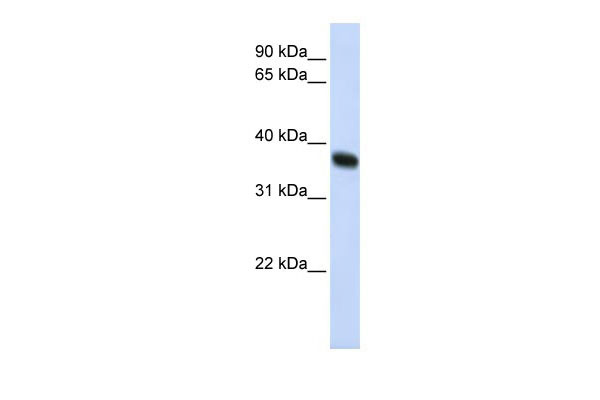ZNF364 antibody - C-terminal region
Rabbit Polyclonal Antibody
- SPECIFICATION
- CITATIONS
- PROTOCOLS
- BACKGROUND

Application
| WB |
|---|---|
| Primary Accession | Q9Y4L5 |
| Other Accession | NM_014455, NP_055270 |
| Reactivity | Human, Mouse, Rat, Rabbit, Pig, Horse, Bovine, Guinea Pig, Dog |
| Predicted | Human, Mouse, Rat, Bovine, Dog |
| Host | Rabbit |
| Clonality | Polyclonal |
| Calculated MW | 34kDa |
| Gene ID | 27246 |
|---|---|
| Alias Symbol | BCA2, RNF115, ZNF364 |
| Other Names | E3 ubiquitin-protein ligase RNF115, 6.3.2.-, RING finger protein 115 {ECO:0000312|HGNC:HGNC:18154}, Rabring 7, RNF115 (HGNC:18154) |
| Format | Liquid. Purified antibody supplied in 1x PBS buffer with 0.09% (w/v) sodium azide and 2% sucrose. |
| Reconstitution & Storage | Add 50 ul of distilled water. Final anti-ZNF364 antibody concentration is 1 mg/ml in PBS buffer with 2% sucrose. For longer periods of storage, store at 20°C. Avoid repeat freeze-thaw cycles. |
| Precautions | ZNF364 antibody - C-terminal region is for research use only and not for use in diagnostic or therapeutic procedures. |
| Name | RNF115 (HGNC:18154) |
|---|---|
| Function | E3 ubiquitin-protein ligase that catalyzes the 'Lys- 48'- and/or 'Lys-63'-linked polyubiquitination of various substrates and thereby plays a role in a number of signaling pathways including autophagy, innate immunity, cell proliferation and cell death (PubMed:20019814, PubMed:30689267). Plays a role in the endosomal trafficking and degradation of membrane receptors including EGFR, FLT3, MET and CXCR4 through their polyubiquitination. Participates together with BST2 in antiviral immunity by facilitating the internalization of HIV-1 virions into intracellular vesicles leading to their lysosomal degradation (PubMed:20019814). Possesses also an antiviral activity independently of BST2 by promoting retroviral GAG proteins ubiquitination, redistribution to endo-lysosomal compartments and, ultimately, lysosomal degradation (PubMed:24852021). Catalyzes distinct types of ubiquitination on MAVS and STING1 at different phases of viral infection to promote innate antiviral response (PubMed:33139700). Mediates the 'Lys-48'-linked ubiquitination of MAVS leading to its proteasomal degradation and ubiquitinates STING1 via 'Lys-63'-linked polyubiquitination, critical for its oligomerization and the subsequent recruitment of TBK1 (PubMed:33139700). Plays a positive role in the autophagosome-lysosome fusion by interacting with STX17 and enhancing its stability without affecting 'Lys-48'- or 'Lys-63'-linked polyubiquitination levels, which in turn promotes autophagosome maturation (PubMed:32980859). Negatively regulates TLR-induced expression of proinflammatory cytokines by catalyzing 'Lys-11'-linked ubiquitination of RAB1A and RAB13 to inhibit post-ER trafficking of TLRs to the Golgi by RAB1A and subsequently from the Golgi apparatus to the cell surface by RAB13 (PubMed:35343654). |
| Cellular Location | Cytoplasm. Nucleus Endoplasmic reticulum. Golgi apparatus. Note=The GTP-bound form of RAB7A recruits RNF115 from the cytosol onto late endosomes/lysosomes |
| Tissue Location | Expressed at extremely low levels in normal breast, prostate, lung, colon. Higher levels of expression are detected in heart, skeletal muscle, testis as well as in breast and prostate cancer cells. |

Thousands of laboratories across the world have published research that depended on the performance of antibodies from Abcepta to advance their research. Check out links to articles that cite our products in major peer-reviewed journals, organized by research category.
info@abcepta.com, and receive a free "I Love Antibodies" mug.
Provided below are standard protocols that you may find useful for product applications.
References
Sakane,A.,(2007)Biochem.Biophys.Res.Commun.357(4),1058-1064ReconstitutionandStorage:Forshorttermuse,storeat2-8Cupto1week.Forlongtermstorage,storeat-20Cinsmallaliquotstopreventfreeze-thawcycles.
If you have used an Abcepta product and would like to share how it has performed, please click on the "Submit Review" button and provide the requested information. Our staff will examine and post your review and contact you if needed.
If you have any additional inquiries please email technical services at tech@abcepta.com.













 Foundational characteristics of cancer include proliferation, angiogenesis, migration, evasion of apoptosis, and cellular immortality. Find key markers for these cellular processes and antibodies to detect them.
Foundational characteristics of cancer include proliferation, angiogenesis, migration, evasion of apoptosis, and cellular immortality. Find key markers for these cellular processes and antibodies to detect them. The SUMOplot™ Analysis Program predicts and scores sumoylation sites in your protein. SUMOylation is a post-translational modification involved in various cellular processes, such as nuclear-cytosolic transport, transcriptional regulation, apoptosis, protein stability, response to stress, and progression through the cell cycle.
The SUMOplot™ Analysis Program predicts and scores sumoylation sites in your protein. SUMOylation is a post-translational modification involved in various cellular processes, such as nuclear-cytosolic transport, transcriptional regulation, apoptosis, protein stability, response to stress, and progression through the cell cycle. The Autophagy Receptor Motif Plotter predicts and scores autophagy receptor binding sites in your protein. Identifying proteins connected to this pathway is critical to understanding the role of autophagy in physiological as well as pathological processes such as development, differentiation, neurodegenerative diseases, stress, infection, and cancer.
The Autophagy Receptor Motif Plotter predicts and scores autophagy receptor binding sites in your protein. Identifying proteins connected to this pathway is critical to understanding the role of autophagy in physiological as well as pathological processes such as development, differentiation, neurodegenerative diseases, stress, infection, and cancer.


